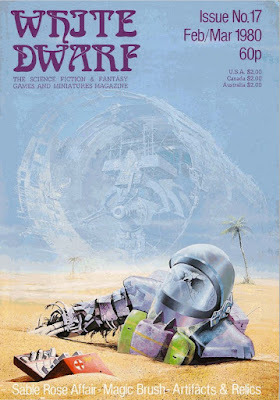White Dwarf: Issue #17
 Issue #17 of White Dwarf (February/March 1980) features a science fictional cover by Angus McKie. In my memory, one of the things that distinguished White Dwarf from, say, Dragon is that the former frequently boasted cover art that drew from SF or that mixed sci-fi with fantasy. As a huge fan of the genre, this always pleased me.
Issue #17 of White Dwarf (February/March 1980) features a science fictional cover by Angus McKie. In my memory, one of the things that distinguished White Dwarf from, say, Dragon is that the former frequently boasted cover art that drew from SF or that mixed sci-fi with fantasy. As a huge fan of the genre, this always pleased me. The issue begins with an interesting editorial by Ian Livingstone, in which he talks about the perceived expense of a roleplaying game versus a more traditional boardgame. "Is this all I get?" he imagines a newcomer to the hobby saying upon opening his D&D Basic Set. Livingstone then suggests that, because RPGs are a niche hobby, they'll always be more expensive than their mainstream counterparts. The only way that will change is if roleplaying games were to appeal to a wide enough audience that mass market factors enter the equation. For that to occur, he opines, RPGs "would have to be modified out of all recognition and lose their appeal." I'm not sure that history has proven Livingstone wrong.
"The Fiend Factory" offers up six more monsters in this issue. Perhaps I am unusual in this respect, but I'm tiring of the "The Fiend Factory." I'd much rather see clever ways to use existing monsters – of which D&D already had an immensity in 1980 – than an endless menagerie of new ones. "Open Box" is mostly given over to Judges Guild product reviews, starting with Under the Storm Giant's Castle (5 out of 10) and Dark Tower (9 out of 10). These are joined by reviews of both Operation Ogre (5 out of 10) and Caverns of Thracia (9 out of 10). This is, I think, a fairly representative sample of JG's output over the years – plenty of forgettable mediocrity but a number of true classics as well. Also reviewed is Yaquinto's game Time War, which receives a score of 8 out of 10.
"My Life as a Werebear" is an unusual article by Lewis Pulsipher. In it, he delves into the question of playing a monster as a character in Dungeons & Dragons. Pulsipher then provides for monster classes for use with the game. They're an odd assortment, consisting of the blink dog, lammasu, stone giant, and titular werebear. While I'm unsure I'd ever allow such characters in my own games, I think the guiding principles behind Pulsipher's designs are solid and the end results are good (though why anyone would want to play a blink dog character is beyond me). Shaun Fuller's "The Magic Brush" is a lengthy article on the finer points of painting miniature figures. Not being a painter myself, I can't speak to its utility, but it is clearly thorough in its treatment of its subject.
"The Sable Rose Affair" by Bob McWilliams is a superb scenario for use with Traveller. The adventure is quite detailed and includes lots of maps and NPCs, all of which contribute to its overall excellence. More noteworthy is its presentation as a series of "modules," which are discrete sections focusing on specific events or locales within the overall scenario. Depending on the approach the PCs take, only certain modules are needed, which offers the referee flexibility in how he adjudicates the course of play. "Treasure Chest" details seven new artifacts and relics, after the fashion of the mighty magic items found toward the end of the Dungeon Masters Guide. They're fine, as far as they go, though none really stand out as memorable.
The issue ends with an interview with Chaosium stalwart, Greg Stafford. It's a truly fascinating interview, one worthy of its own post (which I'll write either later today or tomorrow), in which Stafford talks at length not just about the origins of Glorantha, RuneQuest, and Chaosium but also his general philosophy of roleplaying and related activities. There's some eye-opening stuff in the interview serves as a good reminder – as if we needed one – of why Stafford was truly one of the greats of our hobby.
All in all, this was another fine issue, one that brings the magazine ever closer to the one I remember from just a few years later.
James Maliszewski's Blog
- James Maliszewski's profile
- 3 followers



